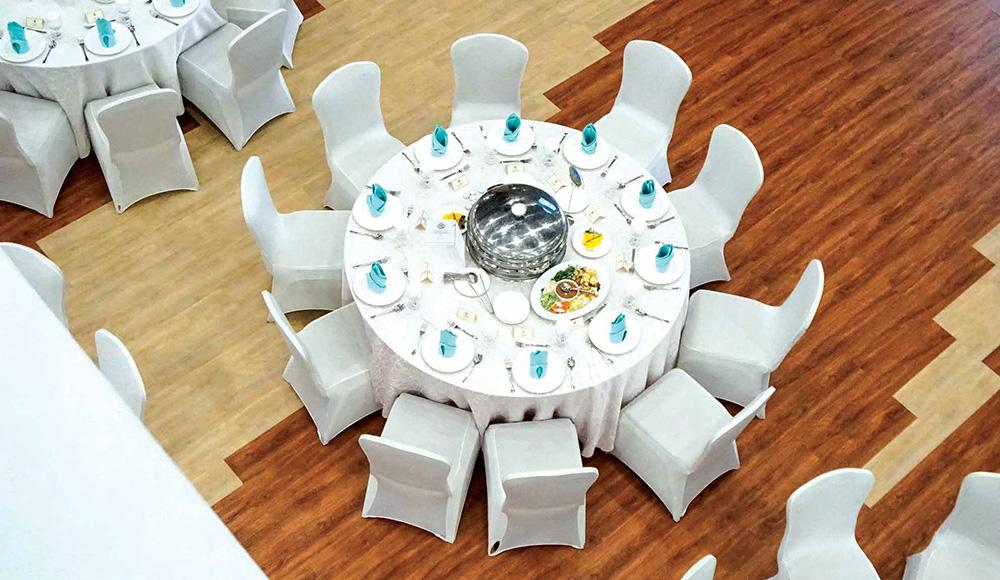The establishment of Brunei Darussalam Food Authority (BDFA) in 2021 marks a pivotal move in ensuring the quality and safety of food in Brunei Darussalam.
With its primary goal centred on elevating standards and ensuring the excellence of food, BDFA is poised to assume a pivotal role in regulating the country’s food and beverage industry.
As a statutory agency, BDFA is actively involving stakeholders during the preimplementation phase of its regulations, exemplifying a collaborative approach to realising its objectives. The regulatory framework is slated for phased implementation, employing a comprehensive strategy to address diverse aspects of food safety.
Key legislative support for BDFA’s functions encompasses the Brunei Darussalam Food Authority Order 2020 and Chapter 182 of the Public Health (Food) Act, which incorporates the Public Health (Food) (Amendment) Regulations 2020. Chapter 182 focuses on upholding safety standards, hygiene, and cleanliness in food premises for both locally-produced and imported food products.
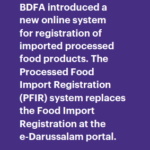 Another crucial legislation outlined by BDFA is the Wholesome Meat Order (2011). The law directs companies to follow the proper procedures in the slaughtering, processing, packaging, importing, distributing, selling, delivering, and exporting of meat and meat products. The Wholesome Meat (Slaughter centre) (Amendment) Regulations 2020 ensures the maintenance of slaughterhouses to safeguard livestock’s health and wellbeing of livestock, emphasising the importance of disease prevention.
Another crucial legislation outlined by BDFA is the Wholesome Meat Order (2011). The law directs companies to follow the proper procedures in the slaughtering, processing, packaging, importing, distributing, selling, delivering, and exporting of meat and meat products. The Wholesome Meat (Slaughter centre) (Amendment) Regulations 2020 ensures the maintenance of slaughterhouses to safeguard livestock’s health and wellbeing of livestock, emphasising the importance of disease prevention.
Also underscored in the Wholesome Meat (Transportation) (Amendment) Regulations 2020 is the significance of a well-maintained supply chain. This includes the inspection of transport containers for cleanliness and hygiene to prevent cross-contamination of meat products, as well as the sampling of products to ensure they meet labelled standards for consumption.
In November 2023, BDFA introduced a new online system for registration of imported processed food products. The Processed Food Import Registration (PFIR) system replaces the Food Import Registration at the e-Darussalam portal. The new system has improved features including the registration of up to three individuals for each company; bundle applications; and ability to make amendments for registered food products. The public can apply for personal import of processed food products for personal consumption.
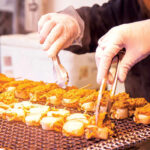 Boosting the local food Industry
Boosting the local food Industry
In early June 2023, Darussalam Enterprise (DARe) launched the fifth cycle of Kontena Park, a food incubation training programme aimed to foster the local food industry’s development. Kontena Park offers businesses an affordable commercial rent to test product and service quality in a real market setting. The programme also serves as a platform for entrepreneurs to gain experience and establish themselves as homegrown food and beverages vendors.
As part of the programme, applicants attend workshops to further improve their business knowledge and skillsets. Vendors also receive marketing and promotion support from DARe.
In essence, the Kontena Park programme is not only a training ground but also a catalyst for economic development, empowering local entrepreneurs to play a significant role in shaping the food industry landscape. The hope is that through such initiatives, more individuals will be inspired to venture into the food and beverage sector, contributing to the overall growth and sustainability of the local economy.
Positive growth
In the first quarter of 2023, the sales of food and beverages services increased by 17.7 per cent compared to the same period of 2022, according to the Department of Economic Planning and Statistics (DEPS). The sales revenue, estimated to have risen from BND91.9 million to BND108.2 million, signifies a robust economic performance in this industry.
In terms of volume, the food and beverages sector demonstrated a positive trajectory with a year-on-year increase of 12.7 per cent. This upward trend can be attributed to the notable increase in catering service activities (50.2 per cent), followed by fast-food outlets (22.8 per cent) and restaurants (19.6 per cent).
For quarter to quarter comparison, the sales value and volume of food beverage services recorded a decrease compared to the fourth quarter of 2022.
The sales value of food and beverages services decreased by 0.6 per cent in the first quarter. This is mainly due to the decrease in sales revenue of other food service activities (3.5 per cent), fast-food outlets (3.1 per cent) and catering service activities (1.8 per cent).
BEN FOODS
Operating since 1980, Ben Foods (B) Sdn Bhd focuses mainly on imports and wholesale as the leader of imported products from countries such as Australia, the United Kingdom (UK) and regional Southeast Asia to Brunei.
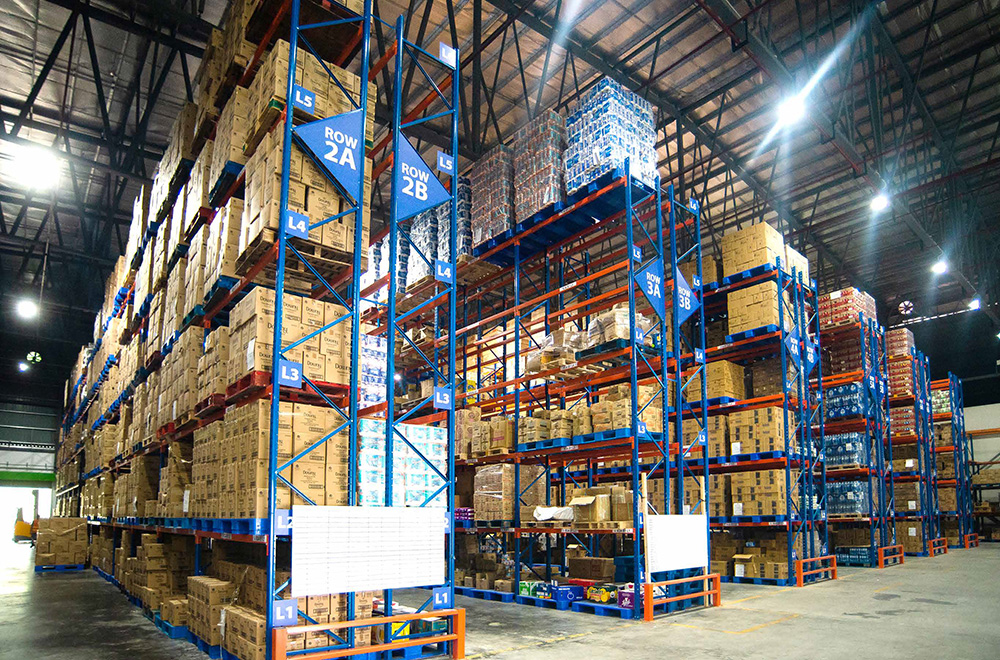 At present, Ben Foods sells and distributes more than 25 international brands in Brunei including well-known brands such as Abbott, Procter & Gamble, Unilever, Kellogg’s and Pringles with a workforce of more than 700 employees. Businesses under Ben Foods include Supa Save, Brunei’s premier supermarket with four branches in Seria, Gadong, Mabohai and One Riverside. The supermarket is renowned for its high-quality groceries from the UK and Australia, with a wide range of gourmet and organic products. Another business division under its banner is GNC, a wellknown international brand that retails clinically studied dietary supplements and vitamins.
At present, Ben Foods sells and distributes more than 25 international brands in Brunei including well-known brands such as Abbott, Procter & Gamble, Unilever, Kellogg’s and Pringles with a workforce of more than 700 employees. Businesses under Ben Foods include Supa Save, Brunei’s premier supermarket with four branches in Seria, Gadong, Mabohai and One Riverside. The supermarket is renowned for its high-quality groceries from the UK and Australia, with a wide range of gourmet and organic products. Another business division under its banner is GNC, a wellknown international brand that retails clinically studied dietary supplements and vitamins.
As one of the biggest food-based companies in Brunei, Ben Foods also operates an impressive warehouse equipped with modern and frozen storage facilities to preserve the quality of its products.
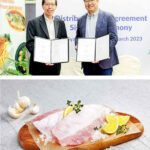 Ben Foods has taken steady paces in its business journey and integrated well amid the fast-changing business environment. In 2023, Ben Foods signed a distributorship agreement with Barramundi Group (B) Sdn Bhd for the nationwide distribution of Kühlbarra products, in line with Ben Foods’ emphasis on premium seafood products. Kühlbarra is the brand name of the group’s sustainably and oceangrown barramundi fish, produced locally as a sustainable quality product for the Brunei market.
Ben Foods has taken steady paces in its business journey and integrated well amid the fast-changing business environment. In 2023, Ben Foods signed a distributorship agreement with Barramundi Group (B) Sdn Bhd for the nationwide distribution of Kühlbarra products, in line with Ben Foods’ emphasis on premium seafood products. Kühlbarra is the brand name of the group’s sustainably and oceangrown barramundi fish, produced locally as a sustainable quality product for the Brunei market.
In an interview with the Borneo Bulletin Yearbook, Ben Foods General Manager Darren Yap said the company aims to be the leader in trading and distributions in the Borneo region. Expanding its product portfolio is one of the ways Ben Foods strives to achieve this as the company moves towards globalisation.
“We are still actively bringing more varieties of products; ranging from Australia and UK, and we are also adding more brands under Ben Foods sales and distributorship division,” he said. “Recently, we have brought in two major brands respectively from Singapore (Irvin’s) and Thailand (CP Foods).” Irvin’s Salted Egg Fish Skin has always been a favourite with many Bruneians and now the former need not go through the hassle of bringing them from Singapore anymore.
Touching on digitalisation and sustainability, the general manager said sustainability is the ability to be maintained at a certain rate or level. “In my perception, we must evolve and stay abreast with world growth in order for a company to stay sustainable,” he said. This involves re-engineering business workflow and adopting new technology to accelerate work processes in the company.
Ben Foods welcomes good business opportunities so it can be a part of new developments and lead the changes in Brunei’s business environment – a legacy that Ben Foods strives to leave in the heart and soul of every Bruneian.
Moving forward, Ben Foods looks to expand its business practices and to import premium products from all over the world to Brunei, giving its shoppers a whole new retail experience while shopping in Supa Save supermarkets. Ben Foods also strives to digitalise its business operations and explore opportunities beyond the Sultanate.
ROYAL BRUNEI CULINARY
Royal Brunei Culinary (RBC) has embarked on a remarkable journey since its inception, evolving into a leading professional culinary service provider renowned for its exceptional quality and innovative offerings. As a versatile and trusted culinary partner, RBC serves a wide array of sectors including aviation, healthcare, F&B restaurants and other institutional sectors.
A pivotal moment in RBC’s evolution was the establishment of its Central Kitchen to centralise operations, streamline production processes, and enhance efficiency. By bringing most of its production under one roof, RBC significantly reduces waste and ensures the consistency and quality of its recipes. This consolidation has allowed RBC to maintain the highest standards of culinary excellence.
In keeping with its philosophy of growth and adaptation, RBC ventured into retail and international markets with its ready-to-eat products. RBC’s foray into retail not only broadened its reach within the domestic market but also set the stage for international expansion.
Sustainability: a core Value
At RBC, sustainability is not just a concept, it is a core value that shapes RBC operations, influences its decisions, and drives its commitment to the environment and the community.
RBC’s collaboration with Biofield Solutions is a bold step toward revolutionising waste management practices within the culinary industry and beyond. By implementing a waste segregation system at the Central Kitchen, RBC aims to efficiently separate organic from non-organic waste. The organic waste is then transformed into fertilisers, a process that not only reduces waste but also supports sustainable farming practices.
RBC has also engaged with Arus Sdn Bhd to collect and repurpose waste oil instead of disposing of it in an environmentally harmful manner, thereby contributing to environmental protection and sustainability.
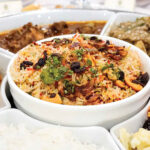 Milestones
Milestones
In 2023, RBC celebrated a series of significant milestones including international expansion, culinary recognition and quality assurance. As part of its international expansion, RBC proudly extended the flavours of Brunei beyond its borders by exporting its frozen ready-to-eat products to Sabah and Singapore. This strategic move not only introduced the unique taste of RBC to an international audience but also set the stage for further expansion into global markets.
Celebrating culinary excellence on the world stage, RBC chefs represented Brunei at the Culinaire Malaysia 2023 prestigious cooking competition and returned with medals including gold. This achievement not only highlighted the skill and creativity of its culinary team but also positioned RBC as a standard-bearer for Brunei’s gastronomy on the international stage.
As testament to its adherence to the highest standards of food safety management, RBC also received its Hazard Analysis and Critical Control Points (HACCP) certification.
Royal visit
The highlight of 2023 was undoubtedly the honour of hosting His Majesty Sultan Haji Hassanal Bolkiah Mu’izzaddin Waddaulah ibni Al-Marhum Sultan Haji Omar ‘Ali Saifuddien Sa’adul Khairi Waddien, Sultan and Yang Di-Pertuan of Brunei Darussalam at the RBC Central Kitchen in July 2023.
His Majesty’s visit was a moment of immense pride for the entire RBC. It was also an opportunity for RBC to showcase its state-of-the-art facilities and the meticulous care that goes into every dish made.
2024 and beyond
At the heart of RBC’s strategic plan for 2024 and beyond lies a dual-focused aspiration: to broaden its market reach internationally and to enhance its operational excellence through prestigious certifications.
RBC sets its sights on exploring the vast potential of exporting to other regions such as Philippines and Thailand with a focus on halal markets. By offering an authentic and diverse halal menu, RBC aims to become a household name among halal consumers worldwide, ensuring that its brand is synonymous with trust, quality and culinary excellence.
To underscore its dedication to quality and safety, RBC is pursuing certifications that are recognised globally for excellence in food safety management systems (FSMS). These certifications will position RBC favourably in international markets, where such accreditations are highly valued.
Sustainability is at the core of RBC’s vision for the future. RBC is dedicated to integrating sustainable practices into every aspect of its business, from sourcing ingredients locally to minimising food waste and optimising energy use in our operations. Beyond environmental stewardship, RBC is also focused on social sustainability, ensuring fair trade and ethical practices along its supply chain.
RBC’s journey forward is not just about growth. It’s about setting new benchmarks in the culinary world and making a difference one meal at a time.

